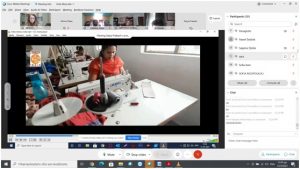Αρχεία για Εργαστήρια Δεξιοτήτων Πλατφόρμα 21+
As our school belongs to the UNESCO Schools Network… – Οι μαθητές της Δ’ τάξης δημιουργούν Κυκλαδικά ειδώλια..
 |
Ο σπουδαίος πολιτισμός μας μέσα από τα χέρια και την ψυχή των παιδιών μας… Σε λίγες μέρες θα ταξιδέψουν στην Ινδία, στην Πολωνία, στην Αγγλία,..
Οι μαθητές της Δ’ τάξης του 5ου Δημοτικού Σχολείου Αγίας Παρασκευής – Χέλμειο, δημιουργούν Κυκλαδικά ειδώλια.. |
 |
The project is part of KA3 Erasmus + project named: “Teachers4Europe: Setting an Agora for Democratic Culture”@https://www.teachers4europe.eu/el/.
Ambassador KA3 Erasmus + project: Hara Bouta |
 |
As our school belongs to the UNESCO Schools Network (@https://aspnet.unesco.org/en-us), our mission is to promote our culture… |
 |
Antonia Pafiliari, εκπαιδευτικός των Εικαστικών, σε ευχαριστούμε πολύ!
Vivi Belegrinou, Class Teacher Kaltsa Vikie, French Teacher
|
 |
 |
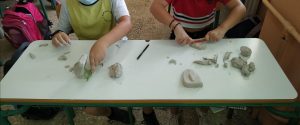 |
 |
On line Cisco Webex meeting on 11th May through etwinning project 5-Teachers4Europe: “I know my rights – Everybody different, everybody equal!”.
 |
As our school belongs to the UNESCO Schools Network (@https://aspnet.unesco.org/en-us), our mission is to promote ideals of UNESCO…
Αξιοποιήθηκε υλικό από τα Εργαστήρια Δεξιοτήτων. Ενδιαφέρομαι και Ενεργώ – Κοινωνική Συναίσθηση και Ευθύνη |
 |
At this meeting we wereteachers from the following schools:
5th Primary School of Agia Paraskevi – Helmeio, Athens, Greece (Α1, Α2, Δ)
16th Primary School of Chalandri, Athens, Greece
3rd Primary School of Neo Psychiko, Athens, Greece
Primary School of All Saints Orthodoxy Charity Limited, Uganda
Szkoła Podstawowa nr 5 im. Janusza Kusocińskiego w Świdniku, Świdnik, Poland
Primary Greek School in London, UK
|
 |
The project is part of KA3 Erasmus + project named: “Teachers4Europe: Setting an Agora for Democratic Culture”@https://www.teachers4europe.eu/el/.
Hara Bouta, Ambassador of KA3 Erasmus+ Project |
 |
Thanks to dear Irene Victo and Paraskevi Namuyanja today we had a different online experience… |
 |
I would like to especially thank my dear colleagues, all the teachers of my school who work hard for making this program happen…
Vikie Kaltsa, French Teacher, Deputy Headteacher,
Antonia Pafiliari, Art Teacher
Vivi Belegrinou, Teacher of the 4th Grade,
Lia Rizoglou, Teacher of the 1st Grade,
Maria Rova, Teacher of the 1st Grade |
eTwinning project 5-Teachers4Europe:”I know my rights – Everybody different, everybody equal!”
Σχετικά με το έργο
We live in a multicultural society. In our everyday life we communicate with
people with different language, different culture and different habits. Diversity is
a situation that we face in schools, in neighborhoods, in all the places we are. In
order to communicate and live harmoniously without tensions we have to respect
each other.
Everyone has rights and obligations. We live in a society and we all interact with
each other. Children are a sensitive age group and in order to be able to live in
harmony with others they need to know and understand their rights. They also
have to understand and behave according to the rules. They must embrace
diversity, listen carefully and accept that everyone is different and equal.
Σχολεία:
5th Primary School of Agia Paraskevi – Helmeio, Athens, Greece (Α1, Α2, Δ)
16th Primary School of Chalandri, Athens, Greece
3rd Primary School of Neo Psychiko, Athens, Greece
Primary School of All Saints Orthodoxy Charity Limited, Uganda
Szkoła Podstawowa nr 5 im. Janusza Kusocińskiego w Świdniku, Świdnik, Poland
Primary Greek School in London, UK
Students:
To know and understand their rights
To understand themselves and behave according to the rules
To embrace diversity
To listen carefully and understand others
To understand and accept that everyone is different and everyone is equal
To provide a general overview of the history of EU so that they become aware of the importance of and necessity for a Union at European level.
To provide learners with the knowledge they need in order to understand diversity and the situation of refugees.
Step 1.
Through artworks that refer to Europe learn the story of Europe. Play the game “Bringing Europe to school teachers.
Step 2
Define the meaning of the word “rights”. Play games.
Step 3
Drawing of rights
Step 4
Imagine that you are going to live in a new empty city. What kind of rules will you create?
Step 3.
Define the meaning of the word “refugee”. Read a story. Role playing.
Step 4.
Make the suitcase of a refugee.
Communicative skills
Technique in speaking
Critical thinking
Ability to cooperate with others
Self- awareness
To know each other better
Videos, PowerPoint presentations, e-books
The project results can be disseminated through a presentation to other school classes and/or to parents, through posts in the social media, through a paper.
On line Cisco Webex meeting on 8th April 2021 through etwinning project: Teachers4Europe:»MAKE YOURSELF AT HOME! (ΣΑΝ ΣΤΟ ΣΠΙΤΙ ΣΟΥ!)».
 |
Today was one more wonderful and unique day for all of us.
92 students and teachers from four different countries are meeting to get to know each other and to present their country, their city, their school.
“I welcome you all! I especially welcome our students. It is a true honor for me to be with you today. Dear children, you are our future. I make a promise- we make a promise that through this project we will try to give you the best we can.“
|
 |
Students and teachers from:
5th Primary School of Agia Paraskevi – Helmeio, Athens, Greece (6th grade),
1st Primary School of Neo Psychiko, Athens, Greece,
School for the
Gifted and Talented Students – Tamra, Israel,
Primary School of Mandria, Mandria, Cyprus and
Primary School of Publiczna Szkoła Podstawowa nr 2 im. Papieża Jana Pawła II w Chorzelach, Chorzele, Poland.
|
 |
As our school belongs to the UNESCO Schools Network (@https://aspnet.unesco.org/en-us), our mission is to promote ideals of UNESCO to young people, especially in the fields of development of education, arts and sciences, natural environment, cultural heritage and human rights. |
 |
The project is part of KA3 Erasmus + project named: “Teachers4Europe: Setting an Agora for Democratic Culture”@https://www.teachers4europe.eu/el/.
Ambassador KA3 Erasmus + project: Hara Bouta Αξιοποιήθηκε υλικό από τα Εργαστήρια Δεξιοτήτων: Ενδιαφέρομαι και Ενεργώ – Κοινωνική Συναίσθηση και Ευθύνη |
 |
I would like to especially thank my dear colleagues, all the teachers of my school who work hard for making this program happen…
Panayiotis Kouvelas, Teacher of the 6th Grade
Vivi Gourna, Teacher of the 6th Grade
Christina Dede, Teacher of the 6th Grade
Antonia Pafiliari, Art Teacher
Valina Chavele, English Teacher
Vikie Kaltsa, French Teacher, Deputy Headteacher
Also, I would like to thank Mr. Vassilis Katsimardos who was here with us today. Mr Katsimardos is the Coordinator of Educational work of our School.
|
 |
 |
 |
 |
 |
 |
 |
 |
 |
 |
 |
 |
On line Cisco Webex meeting on 17th March through etwinning project: “United in Diversity (“Unisdans la diversité”) – Accepting diversity, living in harmony”.
 |
Around165 students and teachers from five different countries are meeting to get to know each other and to present their country, their city, their school. Students and teachers from Tokyo (Japan), London (UK), from Ireland, from Cyprus, from and from Greece! |
 |
As our school belongs to the UNESCO Schools Network (@https://aspnet.unesco.org/en-us), our mission is to promote ideals of UNESCO to young people, especially in the fields of development of education, arts and sciences, cultural heritage and human rights. |
 |
On line Cisco Webex meeting through etwinning project: “United in Diversity (“Unisdans la diversité”) – Accepting diversity, living in harmony”.
A project that is part of KA3 Erasmus + project named: “Teachers4Europe: Setting an Agora for Democratic Culture”@https://www.teachers4europe.eu/el/. Ambassador KA3 Erasmus + project: Hara Bouta Αξιοποιήθηκε υλικό από τα Εργαστήρια Δεξιοτήτων: Ενδιαφέρομαι και Ενεργώ – Κοινωνική Συναίσθηση και Ευθύνη |
 |
Schools that participate in the project:
5th Primary School of Agia Paraskevi (Helmeio) (4th grade), 8th Primary School of Kifissia, 2nd Primary School of Penteli as well as school in Cyprus, the Episkopi Primary School in Limassol, school in Ireland, the Aghamore National School in Ballyhaunis, school in the UK, the Greek Primary School of London, school in Japan, the Ivy Prep International School Team, in Tokyo. |
 |
I would like to especially thank my dear colleagues, all the teachers of my school who work hard for making this program happen…
Vivi Belegrinou, Teacher of the 4th Grade, Elena Boubouka, Class Teacher, Antonia Pafiliari, Art Teacher, Valina Chavele, English Teacher, Vikie Kaltsa, French Teacher, Deputy Headteacher |
 |
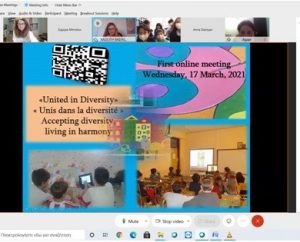 |
 |
 |
 |
 |
 |
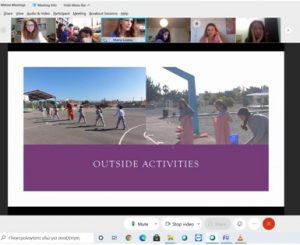 |
 |
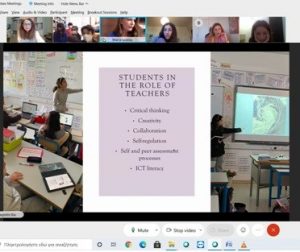 |
 |
 |
 |
 |
 |
 |
 |
 |
 |
 |
 |
 |
On line Cisco Webex meeting on 16th March 2021: etwinning project: Teachers4Europe – “Climate Change: Our Future – Our planet”.
 |
As our school belongs to the UNESCO Schools Network (@https://aspnet.unesco.org/en-us), our mission is to promote ideals of UNESCO to young people, especially in the fields of development of education, arts and sciences, natural environment, cultural heritage and human rights.
A project that is part of KA3 Erasmus + project named: “Teachers4Europe: Setting an Agora for Democratic Culture”@https://www.teachers4europe.eu/el/. Ambassador KA3 Erasmus + project: Hara Bouta Αξιοποιήθηκε υλικό από τα Εργαστήρια Δεξιοτήτων: Φροντίζω το Περιβάλλον |
 |
Today was one more outstanding day for all of us. 115 students and teachers from four different countries are meeting to get to know each other and to present their country, their city, their school. |
 |
Students and teachers from:
5th Primary School of Agia Paraskevi – Helmeio, Athens, Greece (2nd grade, 4th grade, 5th grade), Primary School of Reverend Benjamini Moshi School» in Moshi/Kilimanjaro, Tanzania, 5th Primary School of Neo Irakleio, Athens, Greece, Astir Lindgren Private School No 105, Warsaw, Poland, Greek Primary School in London, England. |
 |
I would like to especially thank my dear colleagues, all the teachers of my school who work hard for making this program happen…
Vivi Belegrinou, Teacher of the 4th Grade, Agni Zorba, Teacher of the 5th Grade, Marilena Kantioti, Teacher of the 2nd Grade, Evaggelia Paschalidou, Teacher of the 2nd Grade, Manolis Velonias, Class Teacher, Antonia Pafiliari, Art Teacher, Valina Chavele, English Teacher, Vikie Kaltsa, French Teacher, Deputy Headteacher. |
 |
 |
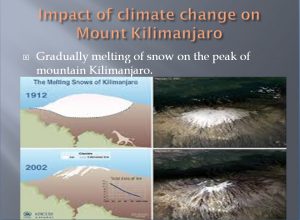 |
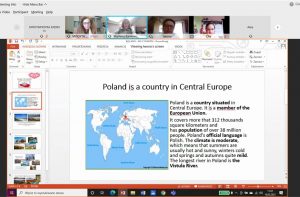 |
 |
 |
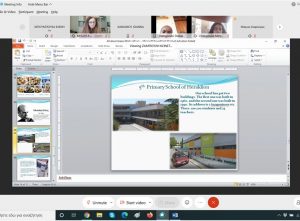 |
 |
 |
 |
 |
 |
 |
 |
 |
 |
On line meeting on 12th March 2021. Project: “Teachers4Europe: “The wider world, connections and links”
eTwinning project 4-Teachers4Europe:”TClimate change: O.FU -O.P(l)A. (Our future -Our Planet)”
Σχετικά με το έργο:
The role of an educator in the 21st century is two-fold: within the broader landscape of teaching young learners 21st century skills(communication, collaboration, critical thinking and creativity), it is of paramount importance teaching them such values as promoted by the European Union. This project aims to explore the EU values as seen and experienced through the eyes of young learners.
According to this project, students learn about the importance of water in our everyday life, and how climate change affects it, but also they realize that EU has certain policies on the matter. They expand their geographical knowledge not only by tracing the countries in a political map of Europe worksheet, but also a map of Africa. They become aware of their own European identity
Σχολεία:
5th Primary School of Agia Paraskevi – Helmeio, Athens, Greece (B1, B2, E1, Δ)
5th Primary School of Neo Irakleio, Athens, Greece
Reverend Benjamini Moshi School” in Moshi/Kilimanjaro, Tanzania
Astir Lindgren Private School No 105, Warsaw, Poland
Primary Greek School in London, UK
Κάντε ¨κλικ” στην παρακάτω εικόνα για να δείτε το project στο google earth
Στόχοι:
Aims:
1. Stimulating students on environmental problems through inquiry-based learning and collaborative approach
2. Enhancing students’ four skills (reading, writing, listening and talking) in English as a foreign language
3. Creating, communicating, exchanging information and collaborating online using ICT
4. Fostering democratic values through debating, analyzing and voting
5. Creating a European identity by learning about other countries and cultures
Διαδικασία:
Activity 1
Step 1. Motivate Ss to take “Be a Climate Hero” quiz and find out how much they know about climate change issues.
Step 2. Encourage Ss to visit sites and decide in groups EU’s climate change policies main key points.
Step 3. Class presentation (ppt, and/or poster)
Activity 2
Step 1. Students watch videos regarding climate change.
Step 2. Students read articles and answer consolidation questions.
Step 3. Using de Bono’s 6 Thinking Hats Ss will consider issues, and problems in Africa, use parallel thinking, go beyond the obvious to discover effective alternate solutions to drinkable water supplies problems, view problems from new and unusual angles, see all sides of a situation, compare and contrast their everyday life to the African way of life, appreciate what is given in the western/European world
Step 4. Produce an e-card describing what they have learnt
Αναμενόμενα αποτελέσματα:
Students are expected to:
– improve/ gain new knowledge regarding environmental problems and EU policies
– create crafts, posters
– improve foreign language skills and competences
-use English as a foreign language in order to communicate with students from other countries
– use interesting ICT tools, web 2.0 tools, smartphones, tablets, etc. in their lessons and make their learning fun
Teachers are expected to:
-develop professionally
-incorporate into their curriculum lessons in an interdisciplinary way
-motivate and raise awareness of fellow teachers on EU legislation regarding the environment and climate change
-learn how to use smartphones, tablets, etc. in their everyday teaching
-network with other teachers in the Regional Directorate for Primary Education and in Europe/Africa
-Presentations at school events.
-Work will be posted on school website.
eTwinning project 3-Teachers4Europe:”United in Diversity (“Unis dans la diversité”) – Accepting diversity, living in harmony”







Σχετικά με το έργο
Τhe main aim of this project is to promote awareness of EU`s value of respect for its cultural and linguistic diversity and enhance their knowledge and understanding of EU`s diversity and unity. The underlying theory that informs practice is that our European challenge relates to how students perceive and accept “other” Europeans and how they perceive themselves in a United Europe. This joint project is designed and developed in order to be implemented in three Greek primary schools, namely:
the 5th Primary School of Agia Paraskevi (Helmeio) (Δ΄τάξη)
the 8th Primary School of Kifissia, and
the 2nd Primary School of Penteli as well as
a school in Cyprus, the Episkopi Primary School in Limassol,
a school in Ireland, the Aghamore National School in Ballyhaunis,
a school in the UK, the Greek Primary School of London,
a school in Malta, the QSI International School of Malta and
a school in Japan, the Ivy Prep International School Team, in Tokyo.
The outcome of this project will be the promotion of EU values and the provision of all the participants with a better insight into the constructs of Unity and Diversity in order to enhance their critical thinking and creativity and improve their communication and collaboration skills.
Πατήστε “κλικ” στην παρακάτω εικόνα για να δείτε το project στο google earth.
Στόχοι
• To provide learners with the necessary information about how the European Union consists of diversity and unity, in that it aims to enrich itself through each country member`s diverse cultures, traditions and languages.
• To foster awareness of EU`S value of respect for its rich cultural and linguistic diversity (Article 3, Treaty on the Functioning of the European Union).
• To enhance learners` competence to express themselves in regard to their European identity and diversity.
– to raise students’ awareness and expand their knowledge about the issue of Diversity in their schools and society, in general.
– Students to cultivate creative thinking and autonomy for their own learning, while at the same time them to cooperate and interact with their peers.
– Students to consider the core values needed for all people to achieve harmonious living and move towards the cultivation and adoption of these values by themselves!
Διαδικασία
Step 1. Warm-up session
During an introductory brainstorming session on the question: “What does it me to be European?”, students admitted that they needed more information in order to enhance their knowledge about the EU and its values. Therefore, we decided to embark on a project pertaining to European cultural identity and to work on the concepts of self-perception and diversity.
Step 2
The students present their findings of their research.
After collecting pertinent information and writing down key words related to “diversity”, a group of students suggested using the title “United in Diversity” (“Unis dans la diversité”) for our project. All the other groups agreed with their suggestion.
Step 3
The students were instructed to draw a portrait of themselves to illustrate their self-perception. The material used is the a A4 paper copy of the mirror of the Museum of the Cycladic Art and the question asked was: I am… How do I see myself? (Je suis… Comment je me vois?).
Step 4
The teacher scanned the pictures and presented them in the class in the form of a padlet that the students had to complete with information about themselves.
Step 5
The students were instructed to look at the following video and write down all the nationalities they could find. They were also asked to reflect on the message of this video and write only one word related to this message. The teacher walks round the class and offers help with language if needed.
Step 6
The teacher distributes the worksheet: “Diversité et Unité en Europe” and asks the students to create a similar padlet entitled: “Je suis Européen” (I am European). The students have to draw an avatar to represent different countries of the EU.
Step 7
The session begins with the song “On écrit sur les murs” by Kids United. The students have to complete the worksheet “Le mur de la diversité” (The wall of diversity) on the notions of Unity and Diversity and all the related elements in the song.
Step 8
The students are asked to make a mind map with all the words associated with related to “Unity” and all the words pertaining to “Diversity”.
Step 9
Based on the concept of the “World Café”, the teacher organises an event named “Les jus du Monde” (World Juices).
Also,
Students watch a 4-minute video based on the first UNESCO Prize for Children’s Literature book, Something Else, written by Kathryn Cave and Chris Riddell.
Students work on the aspects of Diversity and the challenges against accepting and respecting it and which groups will work on the fundamental values that people should adopt towards celebration of Diversity and achieving harmonious living.
Groups of Ss brainstorm a list of key words concerning the issue that they are dealing with and then they create a digital mind map.
Αναμενόμενα αποτελέσματα
• Learners enhance their knowledge and understanding of EU`s diversity and unity.
• Learners become aware and embrace the EU value of respect for diversity.
• Learners enhance their self-reflection, their critical thinking and become aware of their own prejudices.
• Understand the meaning and the importance of diversity
• Enhance knowledge about EU values and present it in alternative ways
• Learn to respect diversity
• Strengthen inquiry skills
• Enhance participation, critical thinking and creativity
• Enhance communication and collaboration with peers
eTwinning project 2-Teachers4Europe:”The wider world, connections and links”
 Σχετικά με το έργο:
Σχετικά με το έργο:
In a world characterized by social change and conflict it is important for students to realize multicultural subjects, challenge stereotypes and become aware of their role as global citizens. Therefore the project will try to create opportunities for exploring global connections, views and values and for engaging positively with other countries and cultures.
Σχολεία:
5th Primary School of Agia Paraskevi – Helmeio, Athens, Greece (Γ1, Γ2, Δ, Ε2)
14th Primary School of Neo Irakleio, Athens, Greeece
Primary School of Literacy India in Gurgaon, India
Primary School nr 37, ZSO nr 5, Zabrze, Poland
Greek School in London, England
Κάντε “κλικ” στην παρακάτω εικόνα για να δείτε το project στο google earth
Provide learners with the necessary knowledge so that they can appreciate the value of different cultures, respect diversity and challenge stereotypes.
Provide learners with the background required to understand how to discover similarities and differences, links and connections between different countries in our globalised world.
Encourage students to look for representations of our multicultural world in various areas of the curriculum.
Themes addressed: Identity, multiculturalism, global citizenship, European values,
discrimination.
School subjects involved: Languages, Arts, Music, History
Materials and Final assignments: Videos, PowerPoint presentations, e-books, padlet
General Plan- Timetable
March-April
ACTIVITY 1
An online meeting which will provide the opportunity for participant collaboration, enhance the relationship among schools, and foster conversation will take place on 12th March. During this meeting partner schools will meet, discuss and exchange ideas. Each country will present its school, give an outline of the activities held and provide information about their city or country.
ACTIVITY 2
Students will create a logo of the project. Key words: the wider world. The logo may include letters, pictures, maps or they may produce a digital design. Then the students of each school will vote for the best logo. Alternatively partner schools may send each other the logos created and vote as well. In this way all the logos will be put to the vote and all the students will take part in the competition.
ACTIVITY 3
Students could make a list of words about each of the partner countries associated with their culture, history, traditions, customs, food, art, sports etc. Then they could create a word cloud (for example https://wordart.com/) either with drawings, collage or digital. They could produce as many word clouds they want which could have the shape of the country or any other shape and with any colours the students prefer. Then they could identify the words that were more frequently used to describe each country.
ACTIVITY 4
History
Students will make the necessary research on the historical background of their country’s monuments and write about famous sights, landmarks or places of interest. These could be places of artistic, historic, political or architectural importance. Collaborative work on the material to make the project is advisable. Then students will make a presentation of the outcome either on paper –pictures collage or paintings or scale models they will make themselves. It could also be a power point presentation or a video.
April
ACTIVITY 5
An online conference will take place and schools can present the results of their activities.
Artifacts.
ACTIVITY 6
Learn about the development of your national heritage through centuries, involving objects made of different materials, pottery, statues, jewellery. Explore Indian/Greek/Polish/English art techniques and the range of materials. Students create models of chosen statues, dishes or vases with clay, paint and varnish their work. Individual and collaborative tasks are welcome.
May-June
ACTIVITY 7
An online conference will take place and schools can present the results of their activities.
Music:
ACTIVITY 7
The highly diverse range of traditional Indian/Greek/Polish/English music. The music of mainland people or ethnic minorities. Traditionally classified musical instruments and scales. Students may perform any chosen piece of music, sing play any instrument they can.
ACTIVITY 8
Food habits and nutrition
Each partner country will write about their everyday food and/or traditional food, eating habits and preferred recipes producing pictures or drawings. They can also create a statistic chart after asking their classmates about their favorite food. When each school presents its project students can discover differences in each culture concerning taste, ingredients, recipes, nutritional habits.









